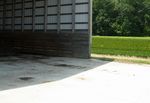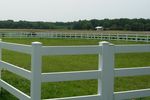Properly Managing Manure for Horses
←
→
Page content transcription
If your browser does not render page correctly, please read the page content below
Properly Managing Manure for Horses
The USDA Natural Resources Conservation Service (NRCS) is
committed to working with farmers, communities and other
individuals and groups to protect natural resources on private
lands. You can begin the conservation experience today! Take a
few moments to think about your land or operation. What are the
conditions of the natural resources? NRCS experts can help you
develop a conservation plan, assist you in evaluating your resources,
provide technical recommendations and identify potential sources
of funding to accomplish your conservation objectives.
Call or visit your local NRCS office:
In Kent County, call 302-741-2600 x 3
In New Castle County, call 302-832-3100 x 3
In Sussex County, call 302-856-3990 x 3
Visit www.de.nrcs.usda.gov
Helping People Help the Land.
USDA is an equal opportunity provider and employer.
DELAWAREPlantings Around the Manure
Storage Structure
It all comes down to water quality. In Delaware and across Soil limitations and drainage are an important consideration
when selecting plantings to screen a manure storage facility.
the nation, the water that we drink starts as rainfall, then Consider the amount of sun/shade where the plants will be
located, as well as the height and breadth when they reach
runs across the land and into the nearby streams and rivers maturity. Note any overhead or underground power lines or
road view needs. NRCS can provide you with
or infiltrates deep into the ground. This rain water can take recommendations of appropriate trees, shrubs, and grasses.
Providing irrigation for the first two years until trees or
shrubs become established will help ensure a good stand.
excess nutrients with it. By properly storing manure, we
ensure that nutrients will stay within the structure or be
absorbed by adjacent filter strips. Doing this helps protect
our Delaware Bay and Chesapeake Bay watersheds.
Windbreaks can remove dust and absorb orders.
Page 2 Page 11Plantings Around the Manure What Is Manure Storage?
Storage Structure
A grass filter strip or other vegetated area should surround
the structure, as well as down slope from the manure storage Manure storage is the temporary containment of
structure. This will allow any stormwater runoff to be waste which includes manure, urine, and bedding.
filtered, allowing nutrients and organic matter to be trapped This temporary storage prevents the loss of the
by the vegetation. nutrients and protects water quality until such time
that the waste can be disposed of properly. Proper
Shrubs and trees planted around the storage area that screen disposal includes composting, spreading on fields at
it from view may also help block dust blowing from the pile
and absorb odors. Using native vegetation is recommended optimum times during the year, or trucking off site.
as it is generally more adapted to the climate and requires A complete manure management system
little maintenance after plants are established. Native plants involves collection (temporary or long-term),
also provide habitat and will attract wild birds and beneficial storage, and disposal or utilization.
insects. The trees and shrubs around a storage area not only
benefit the environment, but will also improve the aesthetics
of the site.
Grass filter strips surround structure to prevent excess runoff from Horse farm in New Castle County, Delaware with manure storage
seeping into the groundwater. structure to the right.
Page 10 Page 3Why Is Proper Storage Necessary? Sizing and Design of Manure Storage Facilities
Bunker style structures are not roofed and are typically
The primary reasons to properly store manure are to for small numbers of horses or short-term storage of
protect water quality and to keep the manure
manure for off-site use. The site for bunker storage
contained until it can be correctly utilized.
must be carefully evaluated and filterstrips are critcal.
When rainfall and storm
water runoff come in
contact with manure, they
can carry nutrients,
pathogens, salts and other
contaminants to nearby
streams—negatively
impacting water quality
and aquatic life.
If the landowner has
cropland, adequate Roofed storage structure designed with pressure-treated wood and metal
storage allows for the fasteners of galvanized steel.
proper land application of
manure to crops when the Storage structures should be at least
100 feet away from all waterways.
nutrients are best utilized.
Many horse farms do not
have the required amount of acreage to spread manure,
so storage facilities allow them to properly store the
manure until it can be removed for an alternative
purpose—this may include the mushroom industry,
nurseries, or other landowners with cropland. Bunker style storage structure with concrete floor.
Page 4 Page 9Sizing and Design of Manure Storage Facilities Why Is Proper Storage Necessary? When planning a design for a manure storage facility, As a general rule, manure storage sites should be size and/or capacity needs to be determined. The located at least 100 feet, depending on site conditions, number of horses, days of storage desired, and the type from any stream or drainage course. Waste storage and amount of bedding will dictate the size and type of structures shall not be located in a 100-year flood plain, storage needed for a facility. If manure is spread on closer than 300 feet from a public water well, or 200 crops, the storage area should be large enough to hold feet from a domestic water well. the manure when the fields are inaccessible. If manure is removed for alternative uses, the size will be determined by the storage space requirements between removal periods. The average 1,000-lb horse excretes 0.8 cubic/feet of manure per day. In addition, bedding will need to be Can someone please help me with a photo caption? removed. On average, 3 cu/ft of sawdust bedding and 4 cu/ft of straw bedding should be removed daily. This bedding will be added to the generated manure to compute the total storage needed in the storage structure. Your local USDA Natural Resources Conservation Service (NRCS) or Conservation District professional can determine the correct size and provide a design for your facility. Roofed manure storage structures are typically constructed on-site and have three walls with an open front. The primary materials used in constructing structures for manure storage will be pressure-treated wood and reinforced concrete. Metal fasteners should be made of galvanized steel to reduce corrosion Wide view of farm shows waste storage structure is not located within problems. These materials are suitable for long-term close proximity to any streams or drainage courses. exposure to animal waste with minimum deterioration. Page 8 Page 5
Location and Site Considerations Location and Site Considerations
The following factors should be considered when
determining the proper location for the storage site:
access by equipment, site drainage and slope. The
manure storage area should be located on a nearly flat
surface that is conveniently located, accessible year-
round, and not subject to flooding or ponding.
The manure storage structure floor should be a base of
compacted clay soil or impervious material such as
concrete. The base should be slightly higher than the
surrounding area and graded so rainwater will move
away from this area.
Anticipate some odor from the manure storage facility Manure storage structure built with a concrete floor helps prevent
since fresh manure is added daily. If possible, place leaching of excess nutrients.
the structure downwind of the stable facility and
residential areas to minimize odors. Summer breezes
are the main concern, when neighbors are less tolerant
because they are outdoors and may have open
windows.
Structures located downwind of residential areas can help minimize
odors.
Page 6 Page 7You can also read



























































